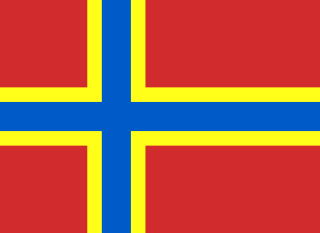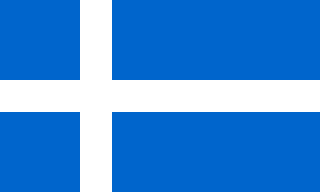A request that this article title be changed to Hoy is under discussion. Please do not move this article until the discussion is closed. |
Hoy is an island in Orkney, Scotland.
Contents
Hoy may also refer to:
A request that this article title be changed to Hoy is under discussion. Please do not move this article until the discussion is closed. |
Hoy is an island in Orkney, Scotland.
Hoy may also refer to:
Norn is an extinct North Germanic language that was spoken in the Northern Isles off the north coast of mainland Scotland and in Caithness in the far north of the Scottish mainland. After Orkney and Shetland were pledged to Scotland by Norway in 1468–69, it was gradually replaced by Scots. Norn is thought to have become extinct in 1850, after the death of Walter Sutherland, the language's last known speaker, though there are claims the language persisted as late as the 20th century.

Orkney, also known as the Orkney Islands or The Orkneys, is an archipelago in the Northern Isles of Scotland, situated off the north coast of the island of Great Britain. Orkney is 10 miles (16 km) north of the coast of Caithness and has about 70 islands, of which 20 are inhabited. The largest island, the Mainland, has an area of 523 square kilometres (202 sq mi), making it the sixth-largest Scottish island and the tenth-largest island in the British Isles. Orkney's largest settlement, and also its administrative centre, is Kirkwall.

Shetland, also called the Shetland Islands and formerly Zetland, is an archipelago in Scotland lying between Orkney, the Faroe Islands, and Norway. It is the northernmost region of the United Kingdom.
A pilot is a person who flies or navigates an aircraft.

Stromness is the second-most populous town in Orkney, Scotland. It is in the southwestern part of Mainland Orkney. It is a burgh with a parish around the outside with the town of Stromness as its capital.
Martin may refer to:
A trow is a malignant or mischievous fairy or spirit in the folkloric traditions of the Orkney and Shetland islands. Trows may be regarded as monstrous giants at times, or quite the opposite, short-statured fairies dressed in grey.

The Mainland, also known as Hrossey and Pomona, is the main island of Orkney, Scotland. Both of Orkney's burghs, Kirkwall and Stromness, lie on the island, which is also the heart of Orkney's ferry and air connections.

Flotta is a small island in Orkney, Scotland, lying in Scapa Flow. The island is known for its large oil terminal and is linked by Orkney Ferries to Houton on the Orkney Mainland, Lyness on Hoy and Longhope on South Walls. The island has a population of 80.

The Northern Isles are a pair of archipelagos off the north coast of mainland Scotland, comprising Orkney and Shetland. They are part of Scotland, as are the Hebrides. The climate is cool and temperate and much influenced by the surrounding seas. There are a total of 36 inhabited islands. The landscapes of the fertile agricultural islands of Orkney contrast with the more rugged Shetland islands to the north, where the economy is more dependent on fishing and on the oil wealth of the surrounding seas. Both island groups have a developing renewable energy industry. Both have a Pictish and Norse history. Both were part of the Kingdom of Norway until they were absorbed into the Kingdom of Scotland in the 15th century. They remained part of it until the 1707 formation of the Kingdom of Great Britain and the 1801 formation of the United Kingdom. They both played a significant naval role during the world wars of the 20th century.
Church may refer to:
Walls may refer to:

Orkney and Shetland is a constituency of the House of Commons of the Parliament of the United Kingdom. It elects one Member of Parliament (MP) by the first past the post system of election. In the Scottish Parliament, Orkney and Shetland are separate constituencies. The constituency was historically known as Orkney and Zetland.
A nation is a unified social community.
Sol or SOL may refer to:

"The Great Silkie of Sule Skerry" or "The Grey Selkie of Sule Skerry" is a traditional folk song from Orkney and Shetland. Sule skerry being a far flung island of the Orkney archipelago. A woman has her child taken away by its father, the great selkie of Sule Skerry which can transform from a seal into a human. The woman is fated to marry a gunner who will harpoon the selkie and their son.

The modern names of Scottish islands stem from two main influences. There are many names that derive from the Scottish Gaelic language in the Hebrides and Firth of Clyde. In the Northern Isles most place names have a Norse origin. There are also some island place names that originate from three other influences, including a limited number that are essentially English language names, a few that are of Brittonic origin and some of an unknown origin that may represent a pre-Celtic language. These islands have all been occupied by the speakers of at least three and in many cases four or more languages since the Iron Age, and many of the names of these islands have more than one possible meaning as a result.
Muckle may refer to: